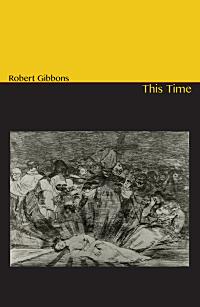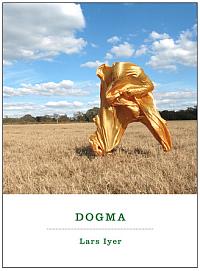|

Televentre
Victor Brauner
b. June 15, 1903
_______________________
Please RT
The Editors, n+1
It’s possible to have a clear attitude toward Twitter if you’re not on it. Few things could appear much worse, to the lurker, glimpser, or guesser, than this scrolling suicide note of Western civilization. Never more than 140 characters at a time? Looks like the human attention span crumbling like a Roman aqueduct. The endless favoriting and retweeting of other people’s tweets? Sounds like a digital circle jerk. Birds were born to make the repetitive, pleasant, meaningless sounds called twittering. Wasn’t the whole thing about us featherless bipeds that we could give connected intelligible sounds a cumulative sense?
The signed-up user is apt to have more mixed feelings. At its best, Twitter delights and instructs.(....)
Twitter, officially a microblogging platform, in practice has often functioned in a way opposite to the blog. Of course a tweet is just a tweet, not to be made too much of. Even so, La Rochefoucauld, Oscar Wilde, Dorothy Parker, Cyril Connolly, the Kafka of The Blue Octavo Notebooks, Cioran?—?they would have been excellent tweeters, and the best tweets, today, rival their greatest one-liners. (In fact to encounter their sententiae parcelled out as tweets would have made for a better experience than reading The Unquiet Grave or The Trouble with Being Born straight through. Aphorisms are ideally consumed like nuts or candies, a handful at a time.) So Twitter doesn’t only have the widely recognized usefulness of providing updates on news and revolution, and illuminating links, and many laughs and smirks. It has also brought about a surprising revival of the epigrammatic impulse in a literary culture that otherwise values the merely personal and the super-colloquial as badges of authenticity. “Write as short as you can/ In order/ Of what matters,” John Berryman counseled in a pre-tweet of 44 characters. Favorite that, followers....(more)
_______________________

Chestnut Tree in the Moonlight
(1904)
Ernst Ludwig Kirchner
d. June 15, 1938
_______________________
Six Poems
Phil Hall
there is a library of strangers in Dublin
Phil Hall
there is a library of strangers in Dublin
Kraków Iqaluit Constantinople Petticoat Junction
I have borrowed two silences from — the best sleep of my life
& light moving in a Stan Brakhage film
far away at home at last
I could not be reached breached or dissuaded
I slept forever & took forever to wake up & when I did
there goes your mime teacher all in white
light was archeologizing a patchwork quilt on a bed
dusting each snag as if there were no budget constraints
the approach of the children & the long-eared goat
was a Latin declension enacted
there is a library of strangers in Dublin
the Troy-warrens of its archives boustrophedonic
silence stoops to eyeball each shard & tag it
light tests its white hands against walls in the air
(distracted indifference from the old goat & the children)
Canadian Poetry Online
University of Toronto Libraries
_______________________

photo - mw
_______________________
from An Oak Hunch
Phil Hall
Brick Books
SAVING A LOST PATH BACK
each evacuated tread cancelling a labeled dig
each bounding hoof-track deep as a nostril
a path contorting like a storm rudder
or a knob on a dash – ingrown by scrub-hawthorn
deak – waree-ree-ree – tchee – tchee
bobolinks fluffing in quillwork shadow
haw-hips detonating clay red in cold bills
guernicas of scythed footage boiling
in the soup of the day – jacklit by vagrant strobes
d eflective-ornery path back
still – I’m going
Phil Hall at Brick Books
12 or 20 questions: with Phil Hall
“Tracking down the Hobo of Recall”: Phil Hall’s White Porcupine
[how Phil Hall's poetry maps tangents of memory]
By Kristin Casady, Rene Diaz Gomez, Sonja Greckol, Lois Lorimer , Issue Editors
lnfluencey Salon
Four poems
Phil Hall
jacket
Phil Hall’s surrural:
Ontario gothic, the killdeer, the music of failure and the distraction of shifting ground
rob mclennan
Killdeer by Phil Hall
reviewed by rob mclennan
_______________________

photo - mw
_______________________
Floor
Poetics of Everyday Critique
Issue #1
Consilience:
The Journal of Sustainable Development
2012: Issue Seven
Behavior and Social Issues
Vol 21 (2012)
Studies in Sociology of Science
Vol 3, No 2 (2012)
Culture Unbound
Volume 4, 2012
_______________________
 consciousness of shock
Victor Brauner

photo - mw
_______________________
Outwith
David Herd
Almost Island
‘The question is how does one hold an apple
Who likes apples’
—George Oppen, ‘The Gesture’
‘The way the combination is made is an example
of what Deleuze and Guattari call consistency—
not in the sense of a homogeneity, but as a holding
together of disparate elements (also known as a “style”).’
—Brian Massumi
1
We might want to think about this question of holding. Maybe we want to notice that it goes to the limit. This is true: that what we hold, and how we hold it, is a limit on us. It is an ethical question, this question of style.
2
It is complicated in the case of apples. If one does like apples, how does one hold an apple in such a way that the apple, not the holding, is what gets shown? For Oppen it is a question for poetry. ‘The question is,’ as he puts it, ‘when will there not be a hundred/ Poets who mistake that gesture/ For a style.’
Oppen is shrewd, and also wrong. If style is an exercise of radical will – the assertion of an individuality – then we might agree that a gesture is preferable to a style. We might agree that gesture and style were different. We might nod towards the apple. That’s that.
Go further though. Consider disparate elements. Consider disparate elements held together. Consider that the holding is not necessary, that it is an intellectual act. The elements held together are an instance of style.
Style is a holding of disparate elements.
Not apples, elements. The question is: which?
3
It is complicated in the case of people. In Giorgio Agamben’s State of Exception, Giorgio Agamben writes about holding. He writes about States and what they hold; about those they don’t hold: the state of exception.
Everybody is held, and everybody not held is also held. The state of exception is a special kind of holding; a place (though not always a place) where those not held by the State are held.
Style is a relation with elements not ourselves.
4
In State of Exception by Giorgio Agamben, Giorgio Agamben writes at length about the grammar of the ban. The ban is the answer to the question: how does that which is not held get held? How does the state hold people it doesn’t opt to hold?
Giorgio Agamben makes the point that the ban has an infinitely supple grammar, that to issue a ban is to address everybody such that some people are separated out. To effect a ban is to address everybody, even those held outside. The ban is the linguistic manoeuvre by which those not held are held.
‘… a holding … (also known as a ‘style’)’
It is an ethical question, this question of holding.
...(more)
.....................................................
From fugue to fugitive:
David Herd’s All Just
reviewed by Stephen Collis
jacket2
_______________________

Aesop's Fables
1927 edition
Takeo Takei
50 Watts
_______________________
The Digital Public Domain: Foundations for an Open Culture [pdf]
Edited by
Melanie Dulong de Rosnay
and Juan Carlos De Martin
The public domain is the sovereign space of all citizens of the world. Like the air we breathe, it is free for all people to use, without restriction, no rights reserved. Our public ownership of this domain of knowledge should be understood as a fundamental human right to access our shared knowledge, the use of which is not the result of a grant by any specific government.
In this book, the members of Communia not only articulates this positive conception of our public domain, but also seek to make the European public domain actionable. The book defines the public domain of the European nations and studies the environment in which it operates. Most importantly, it recommends a set of actions to build and make use of that domain as an environment of shared intellectual property and multifaceted cultural heritage.
Open Book Publishers
via DigitalKoans
_______________________
The Digital Humanities: Beyond Computing
Culture Machine
Vol 12 (2011)
edited by Federica Frabetti
_______________________
The Process of Remembering with the Forgotten Australians: Digital Storytelling and Marginalized Groups
Donna Hancox
Abstract
Digital storytelling projects have proliferated in Australia since the early 2000s, and have been theorized as a means to disseminate the stories and voices of “ordinary” people. In this paper I examine through the case study of a 2009 digital storytelling project between the Australasian Centre for Interactive Design and a group identifying as Forgotten Australian whether digital storytelling in its predominant workshop-based format is able to meet the needs of profoundly marginalized and traumatized individuals and groups. For digital storytelling to be of use to marginalized groups as a means of communication or reflection a significant re-examination of the current approaches to its format, and its function needs to undertaken. This paper posits new ways of utilizing digital storytelling when dealing with trauma narratives.
Human Technology: Investigating the human role in existing and emerging technologies Volume 8, Number 1, May 2012
_______________________
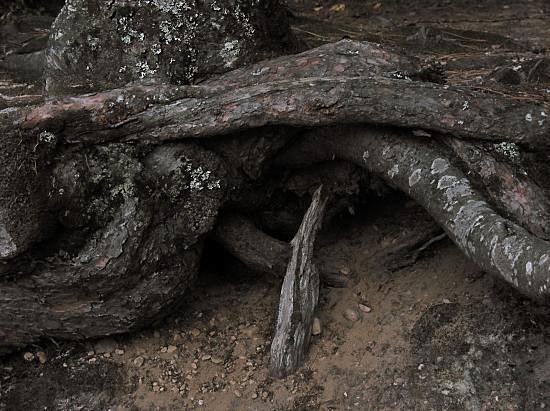
photo - mw
_______________________
Writing the Riots – Paul Goodman and Growing up Absurd
Horatio Morpurgo
Three Monkeys Online
_______________________
The Insurrection of the English Underclass
Takis Fotopoulos
... we should take ‘underclass’ to mean the victims of neoliberal globalisation par excellence, i.e. the unemployed and the marginalised, those living close to subsistence level and particularly the youngsters with no future: in a word, the present-day sans culottes, who do not belong to any of the established social classes as they have not (yet) been integrated into the social system of the internationalised market economy and its political complement, representative ‘democracy’ – unlike the working class, for example, who have been integrated into it to various degrees. Therefore, the underclass are very dangerous to the elites, not because they could overthrow the system, but because they force the elites into taking inevitable counter-action to crush their frequent insurrections, thereby revealing the true nature of what passes for "democracy" today — a political system which ultimately relies on physical violence to reproduce the economic violence on which it is founded. Furthermore, the elites’ backlash could lead other social groups who are presently only partly integrated into the system (low-income, occasional or part-time employees, etc.) to take part in the insurrections of the future and/or – even worse for the elites – to organise themselves ‘from below’ with the aim of overcoming the trade unions and parties controlled by the system and creating an antisystemic movement.
The insurrections of the future, if motivated by an antisystemic project like the Inclusive Democracy project, could in turn establish the conditions for a future society with an equal distribution of all forms of power, i.e. without power relations or structures — the ultimate cause of every aspect of the present multi-dimensional crisis....(more)
The International Journal of Inclusive Democracy Vol. 7, No. 2 (Summer 2011)
_______________________
The Cybernetic Brain:
Gregory Bateson, Zen Schizophrenia, and Captain Beefheart
Kristi Mcguire
The Chicago Blog
(....)Andrew Pickering’s The Cybernetic Brain: Sketches of Another Future explores the largely forgotten group of British thinkers—Bateson included—that tripped the light fantastic at the frontiers of psychiatry, systems management, politics, epistemology, and Eastern thought as the twentieth century came of age. In the excerpt that follows below, he locates Bateson’s ideas on schizophrenia and enlightenment alongside Western appreciations of Zen, as a form of what Foucault might call “gymnastics of the soul.”...(more)
_______________________
'Takin' it to the streets': A Sixties Reader
edited by Alexander Bloom, Wini Breines
mediafire pdf
_______________________

photo - mw
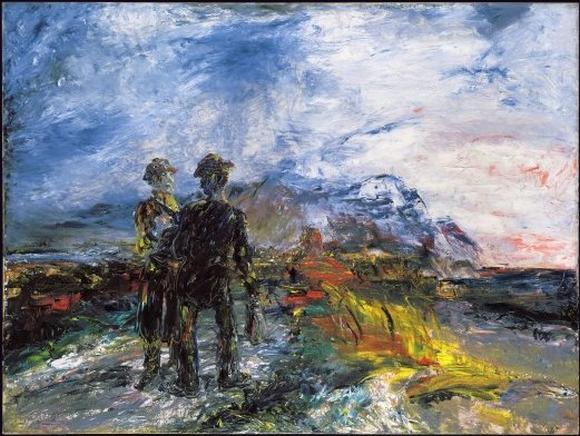
The Two Travellers
1942
Jack B. Yeats
1871-1957
_______________________
YOUNG MAN
And who are you who rail
Upon those dancers that all others bless?
OLD MAN
One whom the dancers cheat. I came like you
When young in body and in mind, and blown
By what had seemed to me a lucky sail.
The well was dry, I sat upon its edge,
I waited the miraculous flood, I waited
While the years passed and withered me away.
I have snared the birds for food and eaten grass
And drunk the rain, and neither in dark nor shine
Wandered too far away to have heard the plash,
And yet the dancers have deceived me. Thrice
I have awakened from a sudden sleep
To find the stones were wet.
—
W. B. Yeat, b. June 13, 1865,
At the Hawk's Well
_______________________
Two poems [pdf]
Robert Gibbons
Janus Head
Spring 2003
At The Hawk’s Well
Robert Gibbons
A rumor has led me, a story told
Over the wine towards dawn.
—
Yeats
My heart fought insomnia all night collaging a faultless life out of wandering, debris, risk, profligacy. The sudden flood of sleep demands I perform a play. On the bare stage I drive a large spike into one of the many gouges in the wooden floor. It bolsters a red wool stocking, encasing a red-glazed Oriental jar.
Ancient artifacts & masks extend the space. Behind the curtain everything is muted, not black & white, but earth-toned, nature brought inside. The plot will center around the idea that our tribe, the other actors, are forbidden color until the jar is found.
I regret not studying, just beforehand, Yeats’s At the Hawk’s Well. Could it be found among the volumes of the theatre’s basement library? Opening night immanent.
The curtain parts.
The director, a woman, is in the audience prompting what I’ll say. Other cast members appear on stage: a group of young men sitting around café tables reading newspapers. I tell them I’ll speak spontaneously, & that their role will be to speak their minds, ask questions, shout out, create potential dialogue, or choric banter. _______________________
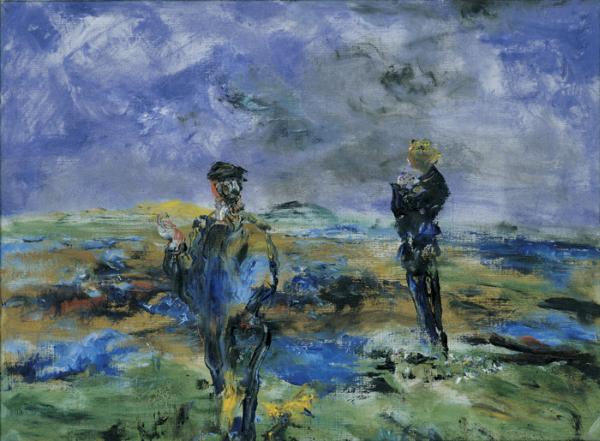
The Top of the Tide
Jack B. Yeats
1955
_______________________
Bridges: Conversations in Global Politics
innaugural issue
Bridges: Conversations in Global Politics represents an attempt to blend the traditional strengths of peer-reviewed academic journals with the advantages of twenty-first century multimedia technology. By drawing on the creativity and insight of junior and senior scholars alike, Bridges aims to foster greater understanding about issues and ideas in the study of global politics in a way that helps teachers to engage students, thinkers to engage new audiences, and peers to engage with each other.
—Bridges Editors
_______________________
Mining The Open Web With ‘looted Heritage’
Introduction
In his overview of what ‘open access’ might mean in the academy, Peter Suber draws attention to the salient features of what it means to call something ‘open’ – that it is digital, the cost (to the reader) is free, and most copyright or similar legal restrictions are relaxed. In this paper, we describe ‘Looted Heritage’, a developing digital archaeology project and its early results that explore ways of leveraging open content, of dealing with the firehose of data that comes when materials can be freely collected and examined. We focus not on the academic open access movement, but rather on the torrent of archaeological materials shared through social media streams such as Twitter and blogs. We focus on user-generated content surrounding the trade in illicit antiquities, reports of looting, and explore the patterns in this data, of not just what is shared, but why.
(....) ... It is a kind of digital excavation, and what we are excavating is the world of social media. We then put all of our data, and our analysis, online to allow others to fill in the gaps. When we mine the open web for information about looted cultural heritage, what are the discourses? What are people saying, does what they say change over time, and do these trends and this excercise hold any lessons for us as archaeologists?...(more)
Electric Archaeology
Digital Media for Learning and Research
via Digital Humanities Now
_______________________

Memory Harbour
Jack B. Yeats
1900
_______________________
Among School Children
William Butler Yeats
(....)
VIII
Labour is blossoming or dancing where
The body is not bruised to pleasure soul.
Nor beauty born out of its own despair,
Nor blear-eyed wisdom out of midnight oil.
O chestnut-tree, great-rooted blossomer,
Are you the leaf, the blossom or the bole?
O body swayed to music, O brightening glance,
How can we know the dancer from the dance?

photo - mw
_______________________
Janus Head
Special Issue: Corpses
Volume 12, Issue 2
Introduction: On Corpses
Rajiv Kaushik, Athena V. Colman & Natalie Alvarez
Why dedicate an entire issue to, of all things, the corpse? One gathers
from the following articles that the corpse reveals an aspect of human life
that escapes most analyses of the body, embodiment, the lived-body, etc.
Such analyses generally aim to reveal the body not as an object but, as
simultaneously sensing and sensible, a site or locus of subjectivity that is
sexually, politically, and historically inscribed. In some fundamental sense,
however, the corpse, though it is still a body, challenges the extent to which
it can be seen as the site of a subject’s inscription. Yet neither is it a mere
object. One way to understand why we would dedicate a volume to the
corpse, then, is because it allows us to interrogate the limits of the embodied
subject. What does it mean to say that there is a body without a subject? Is
the corpse in fact subject-less? It also allows us to investigate this ‘body-thing’
as a vestigial site for certain sexual, political, historical, and representational
commitments. Does the corpse constitute not the structure of subjectivity
but the structure of history or a culture? Or is the corpse antonymic to these
commitments? If so, then what might it instead commit us to, if anything?
_______________________
Beyond Wealth Gap Statistics: The Mobility Gap in the Land of Opportunity
Salvatore Babones
Truthout
There are places in the world where the majority of people are doomed to live no better than their parents and grandparents did. Places where a poor child from the slums might as well dream of being an astronaut as dream of having a decent middle-class job. Places where the children of the rich get even richer while the children of the poor stay poor.
Places like Burma and Kenya and the United States....(more)
_______________________

The Bridge
1913
Egon Schiele
b. June 12, 1890
_______________________
As Language Goes ...
Generating Illusions
Linh Dinh
(....)
For you and I to share this lingua franca, much blood had to be spilled. Countless tons of bombs have been dropped to enable yours truly to pronounce “the” correctly. Without that nasty lucha libre tag-team of Nixon and Kissinger, I wouldn’t be able to tell an enjambment from an A-OK, no problema dosage of agent orange. So thanks to the Pentagon, honestly, I’m going to England to read my poems at the Sussex Poetry Festival.
Hey, I’m thrilled to be invited, but let’s not kid ourselves about how cool it is to be a contemporary American poet, since everything in this culture is aligned against using language sanely, much less towards an inspired exactitude. Postmodern totalitarianism is contemptuous of the poem and the mental habits that it inculcates and demands, such as sustained concentration, reflection and a reverence for shaded, dappled, backlit or scumbled meanings, or for silence. In short, your brain is battered and fried, by design, with a video of it circulating on YouTube....(more)
_______________________

photo - mw
_______________________
In the Name of My Father
Phil Rockstroh
Dissident Voice
(....)
The overreactions and overkill of the national security police state are similar to that of a germaphobe (a sufferer of mysophobia) e.g., the forces of state power marshal overwhelming numbers of militarized riot police and recruit entrapment-happy undercover provocateurs against peaceful political dissenters. Yet obsessive hand washing deployed against imagined microscopic invaders will not serve to soothe the tormented mind of an individual seized with mysophobia, because, in reality, the problem is rooted in the psyche of the sufferer. The further one afflicted withdraws from the world…the larger his fears will loom. Isolation causes the mind to become a self-resonating feedback loop of self-referential fear (e.g., an encampment of peace resisters must be met with violent force to preserve the health of the state's social order).
Providentially, the most propitious treatment for OCD (of both the personal or institutional variety) is exposure to the very things the suffer fears most; i.e., being induced to touch the surfaces that he imagines seethe with vile contagion. Conversely, an army of riot police and billions upon billions of dollar squandered on military hardware and state surveillance can never quell the terror within the isolated elite of a decaying culture.
The neoliberal state resembles Howard Hughes in his final days…shuffling the penthouse floors of a succession of resort area hotels …muttering about microbes…his vast riches and security details offering no balm; his fear of human touch served as a self-issued death warrant. In a nondenominational Pentecost of redemptive paradox, the very thing that evoked such overwhelming fear in him…might have served as the very agency of his salvation....(more)
_______________________
Of Flying Cars and the Declining Rate of Profit
David Graeber
from The Baffler No. 19
(....)
Americans do not like to think of themselves as a nation of bureaucrats—quite the opposite—but the moment we stop imagining bureaucracy as a phenomenon limited to government offices, it becomes obvious that this is precisely what we have become. The final victory over the Soviet Union did not lead to the domination of the market, but, in fact, cemented the dominance of conservative managerial elites, corporate bureaucrats who use the pretext of short-term, competitive, bottom-line thinking to squelch anything likely to have revolutionary implications of any kind. If we do not notice that we live in a bureaucratic society, that is because bureaucratic norms and practices have become so all-pervasive that we cannot see them, or, worse, cannot imagine doing things any other way.
(....)
...claims for the inevitability of capitalism have to be based on a kind of technological determinism. And for that very reason, if the aim of neoliberal capitalism is to create a world in which no one believes any other economic system could work, then it needs to suppress not just any idea of an inevitable redemptive future, but any radically different technological future. Yet there’s a contradiction. Defenders of capitalism cannot mean to convince us that technological change has ended—since that would mean capitalism is not progressive. No, they mean to convince us that technological progress is indeed continuing, that we do live in a world of wonders, but that those wonders take the form of modest improvements (the latest iPhone!), rumors of inventions about to happen (“I hear they are going to have flying cars pretty soon”), complex ways of juggling information and imagery, and still more complex platforms for filling out of forms....(more)
_______________________

Chestnut Tree
at Lake Constance
Egon Schiele
1912
_______________________
TWO POEMS by Edward Perlman
COLLECTING
(....)
I wonder why I’m dead intent on adding
this to my modest box collection. I
cannot say what attracts me so to it.
The ship? The needle case? The ivory clasp?
Did some sea sprite spy in me a mate,
a dreamer who, voyages still before me,
will sail far coasts in sterling moonlight, loot
ivory treasure from a hold, and hear
the clash of swords each time I darn my socks?
3QR: The Three Quarter Review
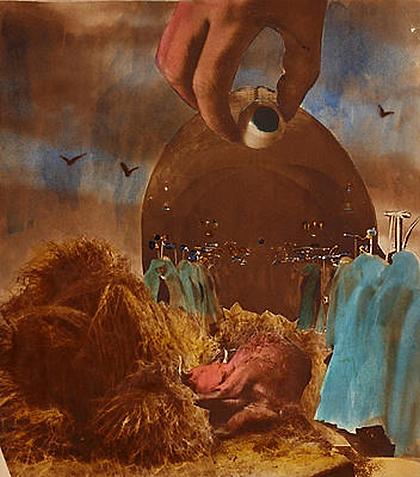
33 Collages
André Breton, Paul Éluard and Suzanne Muzard
Ubu Gallery
via
_______________________
Another World
Interview with David Graeber
Artforum
(....)
MICHELLE KUO: Many artists and critics have been reading your work on everything from the long history of debt, to anarchism, to culture as “creative refusal.” That interest seems to be a reflection of how the art world, at this moment, sees itself in parallel to politics and economics. Why does the art world want to call on economic theories of immaterial labor, for instance, or strategies of resistance tied to such theories and worldviews? We love to import terms from outside our discipline and, frankly, our comprehension. The misprision can often be productive, but it can also be very frustrating.
DAVID GRAEBER: Yes, it’s similar to the relation between anthropology and philosophy—as seen by anyone who actually knows anything about philosophy.
(....)
...if you apply the logic of critique too consistently, you create this almost gnostic notion of reality, that the one thing we can do is to be the person who realizes the world is wrong.
It may be incredibly rewarding intellectually, but it’s also a terrible trap. I always go back to Marx’s famous phrase from 1843, “Toward a Ruthless Critique of Everything That Exists.” It was something he wrote when he was twenty-five, which is appropriate for that age. When I was younger, I felt that way, too. Now I feel that such ruthlessness has its price.
But it strikes me that radical theory has always been caught between that moment and the Marxian moment in which you try to understand the rule, all the hidden structures of power and the way in which every institution that might seem innocuous contributes to reproducing some larger totality, which is one of domination and oppression. And so, if you take it too seriously, critique rather loses its point because it becomes impossible to imagine anything outside. That’s when you end up needing, relying on, the logic of total rupture. Something will happen, I don’t know, a really big riot, and then during the effervescence a new world will just come into being. There are insurrectionists who say that outright.
In the anarchist movement, in fact, there was a movement back and forth between the emphasis on rupture and its opposite. During the global-justice movement, the big word was prefiguration—the notion of building the institutions of a new society in the shell of old. Then came the frustration after 9/11. A lot of people turned back to insurrectionism, which was posed as this radical new theory. Of course it was really going back to one model of anarchism from the 1890s, which incorporated the Marxist logic of fundamental rupture. They combined it with French theory from the 1970s and thought they had something new. It’s a moment of despair.
MK: An exquisite corpse.
DG: Yes, and because of that model, they can’t understand that communism has always been present, which is what I would argue, that it’s the basis of any social relations, any ontological ground of sociality. Instead they see it as something new in the same way that they’ve suddenly discovered immaterial labor—
MK: Or biopolitics, as you’ve pointed out.
DG: Indeed, biopolitics is nothing new. The notion that the health and prosperity of the population are bound up in sovereignty is actually the founding notion of sovereignty.
MK: The question then becomes, What do these everyday moments of communism mean for a theory of the individual? How do they relate to individuality?...(more)
_______________________
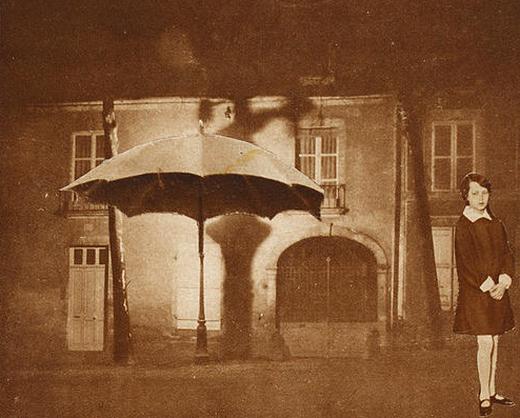
Sous la verriere de Grenelle
["Under the Bell Jar of the Grenelle"]
Suzanne Muzard
1931
_______________________
Pirate Radical Philosophy
Gary Hall
RP 173 (May/Jun 2012)
(....)
Now, some might argue that philosophy’s decentring of ideas of the subject and the human, and associated declaration of the ‘death of the author’, have contributed to the expansion of the neoliberal globalized copyright industry and its shifting of the emphasis even further away from safeguarding the rights of the individual author as original creator, and onto safeguarding the rights to a commodity which can bebought and sold regardless of who created it. By the same token, however, if we are inclined to be generous, the tendency on the part of many philosophers and theorists to assert vigorously their authorship of particular works, ideas and concepts (e.g. so-called ‘object-oriented philosophy’), thus both enclosing and branding them by association with a proper name onthe basis they are ‘all mine’ (an original expression of their own unique selves) can be positioned as one attempt to make this shift in emphasis from culture and human authorship to economics and property ownership a little less smooth. From this perspective, the risk copyright infringement poses to authors is more to their moral rights, and in particular: (1) the right of attribution – which, to return to the example employed above, AAAAARG does not tend to threaten, as the authors of most of the texts on the knowledge-sharing platform are clearly named and identified as such (you can browse its library by author surname); (2) the right of integrity, which enables authors to refuse to allow the original, fixed and final form of a work to be modified or distorted by others; (3) the right of disclosure, which covers the right to determine who publishes the work, how, where and in which contexts. AAAAARG may represent for some academics a loss of reputation, honour and esteem, to the degree that their work is being republished outside the conventional institutional frameworks and in places and ways other than those of their choosing.
The question we need to ask, though, is to what extent operating according to the moral rights of attribution, integrity and disclosure leads philosophers and critical theorists to act to all intents and purposes as if they continue to subscribe to the idea of the author as individual creative genius that emerged from within the cultural tradition of European Romanticism – a notion that the humanities’ critical interrogation of the concepts of the subject, the human, and indeed the author was in many respects an attempt to challenge. For it is precisely this romantic belief that underpins the idea of the work as the original expression of the unique personality or consciousness of the human author, and on which such moral rights are in turn based. This is not to imply we should necessarily do away with the concept of the author. Yet what the above argument does suggest is that we need to explore further how radical thought can enact ideas of authorship in ways that do not either slip back into compulsively repeating a version of romantic individualism and its ideas of originality, or empty this out so that texts merely become exchangeable commodities. To provide one example of how we might begin to do so, could we perhaps try acting something like pirate philosophers?...(more)
_______________________
Information Feudalism: Who Owns the Knowledge Economy?
Peter Drahos, John Braithwaite
google books
pdf available at Monoskop/log
_______________________
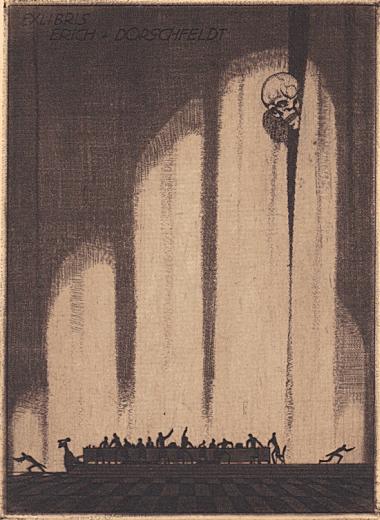
Ex Libris Mr. Reaper
from the collection of Richard Sica
50 Watts
_______________________
From Reveler
Andrew Durbin
conjunctions
It is true my face beheld
The crestfallen captcha
That reads the end of the world
Is bound to the end
Of the weekend
I buried my face in fox fur
The fur of a living fox
I held a fox once
War is not a fox
I went swimming in a lake
I felt the war touch my ankle
The lake held the names
Of my friends
Who were not at the lake
...(more)
_______________________
Trace
rob mclennan
And the dog keeps her eyes locked on the vanishing point, which alone is what
is pulling them (dog and man) silently, smoothly, inexorably into the heart of the
18th century. It's the future that vanishes, not thinking, and the dog sets off at a
run, as it is, as it always has been, her gift and her wish to bring it back to him.
Cole Swensen, greensward
[a circumstance, a western link]
We vocalize what this is: human. Ninety-six foot wide concession, road. Separating Sparks
and Besserer. The west was Wellington, the east, Rideau. We would have our gardens. The rope
lends lazily, descends. Death weighs, no mass. Possibly, our rhetorics. The heart, plus this
alone. A mass of modern bus and antiquated streetcar. The power of an average. Slanting,
ruin. Heritage crumbles, the fold of which inside. Trace, nearly obliterated. Configurations
from a stain. It is one, or it is other. I am meaning the opposite.
(....)
Lightning'd Press
Issues #3 and #4 (May and June 2012) - rob mcLennan, Brooks Lampe, Corey Wakeling, Jnana Hodson, Jamie Felton, Steven Manuel, Patrick James Dunagan, Ryan Barker, Felino A. Soriano, Jeff Miller, Thomas Meyer, R.N. Horner, Whit Griffin, Ric Carfagna, more in our ongoing interview with Peter O'Leary, correspondence from Thomas Meyer
_______________________
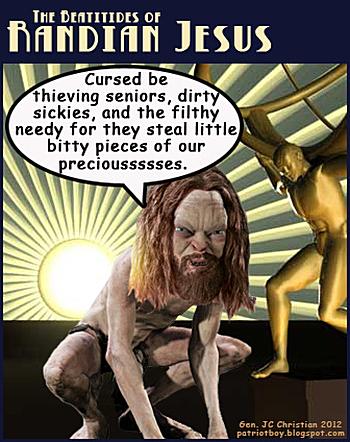
The Beatitudes of Randian Jesus
Jesus' General
by Gen. JC Christian, Patriot
_______________________
Canadians owe a debt to Quebec’s student strikers
Rick Salutin
We owe them for taking a shot at saving our national honour in the eyes of the world. We’ve lost brownie points on the environment, our even-handedness in areas like the Mideast, our commitment to peacekeeping — but their campaign for equal, publicly funded access to higher education hits a note closer to that other, previous Canada. I should add I don’t begrudge the Harper government its shifts; it’s what they said they’d do. But they don’t reflect the attitudes still held by more than 60 per cent of the population — at least according to how they vote.
We owe them for striking a blow on behalf of public discourse. I’m thinking here of the term entitlements, which has replaced rights in the discussion. When did health, housing, a dignified retirement, etc., stop being human rights and turn into shabby, whiny entitlements? It didn’t just happen. There’s a linguistic war on, and it isn’t French versus English; it’s over politically loaded terms.
(....)
A good old-tyme strike. This may be your last chance to see one before they’re all sent to the Museum of Civilization — the way the Harper people are banning them long before they ever start. As in any good strike (and yes, there are bad ones), the outcome hangs on the public’s reaction.
We’re seeing a fresh start for the public imagination. Do you ever tire of hearing about everything that’s now impossible and how we need to get real? It’s only in the last few decades that governments became bodies exclusively devoted to eliminating whatever was once built by and for everyone — like public education. Those days lie within historical memory — at a time when our society was less wealthy and its people less educated. They’re also sometimes just a plane ride away, like Finland, where schooling is free right through university — and it’s a lot like Canada, except without our natural resources! It isn’t undoable, it’s merely become unthinkable, except for those neat students in the streets of Quebec....(more)

Missouri River, Missouri
Along the Way
Christopher Bennett
via Joerg Colberg
_______________________
public space
Ken Babstock
Wandering wordless through the heat of High
Park. High summer. Counting the chipmunks
who pause and demand the scrub stand by
till their flitty, piggybacked equal signs can think
through this math of dogwood, oak-whip, mulch.
Children glue mouths to ice cream and chips, punch
and kick at the geese, while rug-thick islands
of milt-like scum sail the duckpond’s copper stillness –
Over-fat, hammerhead carp with predator brains...
We can wreck a day on the shoals of ourselves.
Cramped, you broke last night and wept at the war,
at the ionized, cobalt glow that fish-tanked the air.
We’re here to be emptied under the emptying sky,
eyes cast outward, trolling for the extraordinary.
Ken Babstock, winner of the Griffin Poetry Prize 2012
Some describe lyric as a lone voice speaking directly (and clearly) to the reader. Others might say it is a voice as high on language as it is on sound and rhythm, as piercing in its intellectual pursuit as its emotional. But what about a voice that negotiates the fragmentary nature of self and world in every line? That turns formal constraints into pun and play? Methodist Hatchet is as precise as it is expansive, as complex as it is companionable. It refuses to look away from the unstable nature of self and world and word. That is why Babstock is one of the most exciting lyric poets writing today.
- Sina Queyras
_______________________
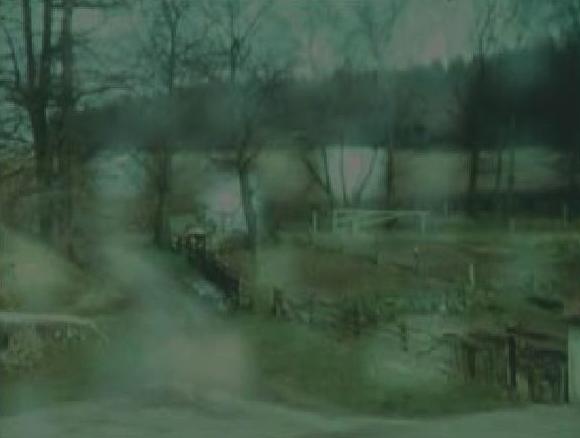
3175 Asylum
1975
Kurt Kren
18 short films by Viennese Aktionist Kurt Kren, father of postwar European avant-garde cinema
ubuweb
_______________________
To Save and Destroy:
Melvin B. Tolson, Langston Hughes, and Theories of the Archive
Kathy Lou Schultz
The importance of archives lies not only in the ways in which their contents can be used physically to mark history; as Jacques Derrida shows, the archive also creates within it implications extending to the exercise of power and social control. In Archive Fever: A Freudian Impression, he explains that the term archive "coordinates two principles in one": "commencement" and "commandment." Beginning with the Greek arkh, Derrida joins the first principle, "there where things commence," the "physical, historical, ontological principle," with the second, the legal valence "there where men and gods command," which is also importantly "there where authority, social order are exercised, in this place from which order is given". The historical and social implications of the making of the archive are thus always contested. In their work of the 1950s, African American poets Langston Hughes and Melvin B. Tolson intervene into the construction of the archive of U.S. history, using their poems to comment upon the making of national identity. As African Americans situated under the historical weight of the state using the entire force of its various apparatuses—religious, economic, and legal—to destroy the history and culture of people of African descent in order to preserve the institution of slavery, Hughes, in "Prelude to Our Age: A Negro History Poem" (1951), and Tolson, in Libretto for the Republic of Liberia (1953), "write back" by using the poem form to archive African American accomplishment. Hughes and Tolson write into the voids in official records, making their own histories, highlighting the fact that the construction of the archive—of memory—must constantly be tended. "There is no political power without control of the archive, if not of memory," Derrida reminds us; "[e]ffective democratization can always be measured by this essential criterion: the participation in and the access to the archive, its constitution, and its interpretation". Combating potential effacement by the social and legal conditions of daily life for black men in mid-twentieth-century America, Hughes and Tolson present a revisionist agenda constituted not only by the conscious, assertive action of writing people of African descent into the historical record, but also by a palimpsestic writing onto, an action of overwriting. In doing so, each overwrites accepted narratives of American nationhood....(more)
Flashpoint
Spring 2012, Web Issue 14 Melvin B. Tolson (1898 - 1966) at the Poetry Foundation
_______________________

Island Sheds, St Ives
1940
Wilhelmina Barns-Graham
b. June 8, 1912
_______________________
Hoffos at MOCCA, Hester at ACCA
Ken Babstock
walrus
Subfusc, innerwhelmed,
surfing some weightless valence of privilege and
white glare
on the esplanade at St Kilda. Sun batters
a quincunx of big, deliquescent palms. The harbour’s
all Piaget Chronograph. Blackened teeth
of leisure craft, their long, inverted, evening roots.
Raked sand.
The exteriorized event space, man,
then the “looking you” gone mini-mini,
then a motor north of your liver beebled.
(....)
the unvaliant mind leans out, confected palm, Tasman
Sea, range life, whaling vessels, to light
momentarily on a desiccated rookery,
tchotchke hatchlings low-hanging
fruit to the cored-out auk.
The colony’s contracting, it’s warmer, on average, overall.
Dear Bio-Tech, we’ll consent, barring unforeseen… etc.,
to augmentation, for a fee. The tone and texture’s ’79.
...(more)
_______________________
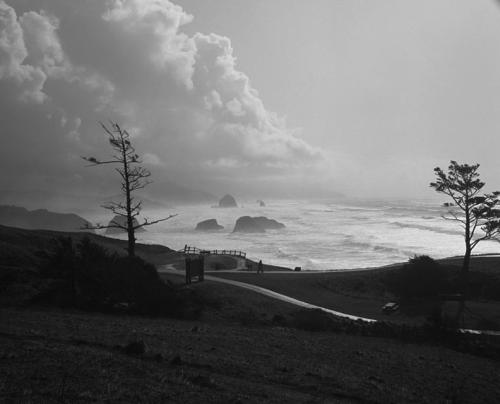
Ecola Point, Oregon
Christopher Bennett
_______________________
Four Poems by Narlan Teixeira
exquisite corpseThe prophecy
Narlan Teixeira
Behind these insane prophets
the roman columns
these stone bridges
the world's words
so many buildings
these train stations
the philosophy
the steps of history
the faces of men
so many gospels
so many holy books
so many marginal ones
the starvation in the world
an inkless pen
every opium every tree
these bugs spiders
those protest songs
rock in roll spirit
every broken record
every child crying
every refugee camp
every lost dream
centuries of mistakes
every blind man
the quantum theory
every lie
Behind everything
There's a truth that we need desperately to see
...(more)

Yellow Tulips
1923
Charles Rennie Mackintosh
b. June 5, 1868
_______________________
Take Me Home
Ray Bradbury
June 4, 2012
(....)
While I remained earthbound, I would time-travel, listening to the grownups, who on warm nights gathered outside on the lawns and porches to talk and reminisce. At the end of the Fourth of July, after the uncles had their cigars and philosophical discussions, and the aunts, nephews, and cousins had their ice-cream cones or lemonade, and we’d exhausted all the fireworks, it was the special time, the sad time, the time of beauty. It was the time of the fire balloons.
Even at that age, I was beginning to perceive the endings of things, like this lovely paper light. I had already lost my grandfather, who went away for good when I was five. I remember him so well: the two of us on the lawn in front of the porch, with twenty relatives for an audience, and the paper balloon held between us for a final moment, filled with warm exhalations, ready to go.
...(more)
Ray Bradbury(August 22, 1920 – June 5, 2012)
_______________________
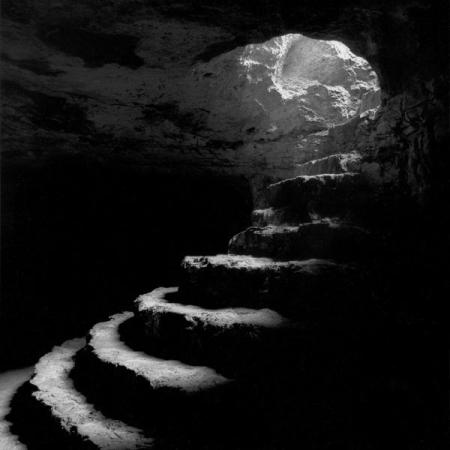
Pause
Sally Gall
2001
_______________________
Welcome to the Wormhole
James Howard Kunstler
Now we get to the really fun part of the global unwind where even money flowing into supposedly safe havens turns, presto change-o, into an evaporation of wealth, and all of the lawyer-lobbyists who ever double-parked on K Street in the sorry history of this frantic era will not avail to contain the demons of their own design.
The world is waiting to re-learn an old lesson: that untruth and reality exist in an adversarial relationship. Sad to say, there isn't enough legal infrastructure in the world, nor enough time, to pass judgment on all the lies and misrepresentations that burden the current edition of what passes for civilization. This goes especially for money matters, where currencies, certificates, and contracts actually have to represent what they purport to stand for. When those relationships fail, as they have been doing for some years now, everything falls apart....(more)
_______________________
Annotation: Infrastructure, Infra-political
Angela Mitropoulos
s0metim3s
(....)
To think politics as infrastructural is to set aside questions of subjectivity, identity, demands, promises, rights and contracts, and instead to render visible the presumptions that the knots of attachment, adherence, care or fondness and have already been tied by nature or supposedly incontestable forms of connection (by kinship, race, money, sexuality, nation, and so on). Because we know that the so-called decline of the welfare state has in fact entailed the narrowing of infrastructure to the point that those outside these conventional forms are indeed going-without. How the question of infrastructure plays out is crucial to the trajectories of the occupations, protests and conversations about what might it be possible to accomplish. It is one of the greatest achievements of the occupations that they fed so many strangers over such a period of time at a time when the numbers of people on food stamps in the US rose to over 40 million. It is one of the terrible disasters of ostensible anti-neoliberal campaigns elsewhere that the problem of infrastructure has been resolved by theocratic injunctions confining women to the home. The materialities of infrastructure render it the most pertinent political question there is – everything else is distraction....(more)
_______________________
The Elephant in the Room: The Police and the Occupy Movement
an interview with Kristian Williams
author of Our Enemies in Blue: Police and Power in America and American Methods: Torture and the Logic of Domination
(....)
The cops have been doing counterinsurgency since the 1970s. It's called "community policing." Coming out of the 60s, the cops knew that they were lacking public support, and that that had cost them during the previous decade. So they started looking for ways to improve their standing. The negotiated management version of crowd control was one element of that shift, as was the Neighborhood Watch, the return to foot patrols, and citizen advisory boards, and so on. All of those things have the effect - in fact, the intent - of building a bond between the community and the police, which the police can then use to gain access, information, increased resources, and greater power. It also meshed easily with efforts to co-opt community leaders and channel criticisms into forums that the state can manage and even accommodate, but which don't fundamentally challenge existing power relations.
And community policing arose, not accidentally, alongside the other major shift in policing - militarization. They both developed in response to the unrest of the sixties, and by and large they operate together....(more)
_______________________
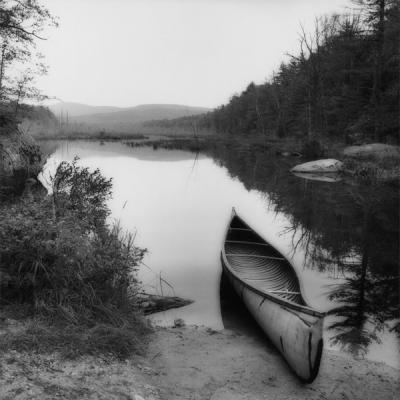
Canoe
Sally Gall
1992
_______________________
Boundary Breach
Kierstin Bridger
Pick up the button hole
or eye of needle
with hard squint
see inside
salute the high sun
see us lucid but listing
hands open
I can conjure us
like that
dip of oar
the silvered pond
interruption of glass
the canoe– our reflection in mad
Van Gogh dashes–
un-mired by melt
we sit quietly in memory
waiting for an August noon
of yarrow perfume,
sweet sting of thistle
leading us there
...(more)
THRUSH Poetry Journal
May 2012
_______________________
Sweet Soul Music:
Playing Metaphysical Ping Pong With Soren Kierkegaard And Van Morrison
Brad Zellar
Your Man For Fun In Rapidan
The forest. The sea. The garden. The grindstone. The long and winding road. The moon. The stars. Sunrise. Sunset. Ecstasy. Exhaustion. The heart as metaphor. The heart as living, beating thing. Myths. Dreams. Reality. Then. Now. Here. There. Beyond either here or there. 'This pining meat.' The ticking clock. The second hand. The hours. The days. The years. The biding of time. Time passing. Time was. Abiding. Abrasion. Erosion. Confusion. Clarity. Grace. Restlessness. Contentment. Hope. Happiness. Hopelessness. The middle passage. The middle of the night. The muddle. The crowded room. The missing thing(s). The mask. ...(more)
_______________________
Obscure Records (1975-78)
The complete run of all 10 LPs from Brian Eno's legendary record label [MP3]
UbuWeb
A Rock/Experimental Homage To John Cage
w/J.Ramone, D.Harry, D.Byrne, J.Biafra, J.Zorn, L.Ranaldo + [MP3]
UbuWeb
_______________________
Why Google Isn’t Making Us Stupid…or Smart
Chad Wellmon
The Hedgehog Review 14.1 (Spring 2012)
(....)
The modern hyperlink and the Enlightenment footnote share a logic that is grounded in assumptions about the text-based nature of knowledge. Both assume that documents, the printed texts of the eighteenth century or the digitized ones of the twenty-first century, are the basis of knowledge. And these assumptions have come to dominate not only the way we search the web, but also the ways we interact with our digital world. The history of the footnote is a curious but perspicuous example, then, of how normative, cultural assumptions and values become embedded in technology.
...(more)
_______________________
The Curious Case of Internet Privacy
Free services in exchange for personal information. That's the "privacy bargain" we all strike on the Web. It could be the worst deal ever.
Cory Doctorow
_______________________

photo - mw
_______________________
Crutches
Nikki Giovanni
b. June 7, 1943
it's not the crutches we decry
it’s the need to move forward
though we haven’t the strength
women aren’t allowed to need
so they develop rituals
since we all know working hands idle
the devil
women aren’t supposed to be strong
so they develop social smiles
and secret drinking problems
and female lovers whom they never touch
except in dreams
men are supposed to be strong
so they have heart attacks
and develop other women
who don’t know their weaknesses
and hide their fears
behind male lovers
whom they religiously touch
each saturday morning on the basketball court
it’s considered a sign of health doncha know
that they take such good care
of their bodies
i'm trying to say something about the human condition
maybe i should try again
if you broke an arm or leg
a crutch would be a sign of courage
people would sign your cast
and you could bravely explain
no it doesn’t hurt—it just itches
but if you develop an itch
there are no salves to cover the area
in need of attention
and for whatever guilt may mean
we would feel guilty for trying
to assuage the discomfort
and even worse for needing the aid
i really want to say something about all of us
am i shouting
i want you to hear me
emotional falls always are
the worst
and there are no crutches
to swing back on
Nikki Giovanni at the Poetry Foundation

photo - mw
_______________________
Postmodern Pollution
Paul Virilio, Grey Ecology
Duane Rousselle
ctheory
"So, my interest here today, via the dromosphere, is the passage and the acceleration of history and the acceleration of reality through new technologies, it is the foreclosure of the world. It is the closing-in of the world. The pollution of time and distance is much more severe, in my opinion than the pollution of material substances."
-- Paul Virilio
Politics as the surplus of need rendering possible an activity of novelty in the scopic field; this, in essence, defines the public realm as the sphere of action. Hannah Arendt insisted that those who acted in the public realm were courageous -- but for so long courage referred to inner-most feelings rather than to the natality of action in the public realm. What could be more inner than that which is outside? What this something strange to me, although it is at the heart of me is, for Lacan, is precisely the real of things from which we are barred. It is an outside that is paradoxically at the very heart of the subject. Things have withdrawn from our viewing of them and, as such, the fear that they arouse does not and can not relate to the public realm of perception. Contrarily, politics begins with our frightening relationship to things in the world and with our inability to become the thing among things that we are....(more)
_______________________

photo - mw
If a Garden of Numbers
Cole Swensen
If a garden is the world counted
and found analogue in nature
One does not become two by ever ending
so the stairs must be uneven in number
and not exceed
thirteen without a pause
of two paces’ width, which
for instance, the golden section
mitigates between abandon
and an orchestra just behind those trees,
gradations of green that take a stethoscope: we risk:
Length over width
to make the horizon run straight
equals
to make the pond an oval:
Width
over length minus the width
in which descending circles curl
into animals exact as a remainder.
Which means excess. The meaning of the real
always exceeds that of the ideal, said someone.
...(more)
Cole Swensen at the Poetry Foundation
12 or 20 questions: with Cole Swensen
rob mclennan
Where the real exceeds the ideal (PoemTalk #52)Cole Swensen, "If a Garden of Numbers"
via The Page
_______________________
Here + Walter Benjamin's Central Park
Robert Gibbons
Time Capsule
(....)
II.
Imagine, Central Park. He tailors his findings on Baudelaire writing during his Time in Paris by attempting to apply the same principles to New York City, where friends & colleagues had offered to find him work & an apartment near Central Park. One of his initial correspondences was to define Baudelaire’s “Modernity” as giving expression to extreme spontaneity, which he refers to, after Jules Laforgue first broached it as Baudelaire’s “Americanism.” This does my heart good, seeing Baudelaire as the father of the prose poem, & knowing it is, first & foremost, at least for me, an act of revolt. I continue to hear jackboots of Death haunting Benjamin, hoping to house his archive & find a job in New York. He sees New York as one of the great cities of the world, which possesses a “labyrinthine character” with “an image of the Minotaur at its center.” “…he [the Minotaur] brings death to the individual… is the image of the deadly power he embodies…” (His ambivalence to the chance of ever making it to New York?) Benjamin points out the facts & obsessions of Baudelaire’s Time as the fetishization of commodity, prostitution, & the marketplace. Adds here, for his own purposes, again, in Central Park, “Emigration as a key to the big city.” Are his Columbia University colleagues listening? Toward the end of the 46 loose-leaf sheets that make up Central Park, Benjamin asks almost rhetorically regarding Baudelaire’s belief or non-belief in progress, “Walt Whitman?” The editors point out that additionally, in preparation for his ill-fated trip to America, Walter Benjamin reads William Faulkner’s novel, Light in August.
...(more)
_______________________
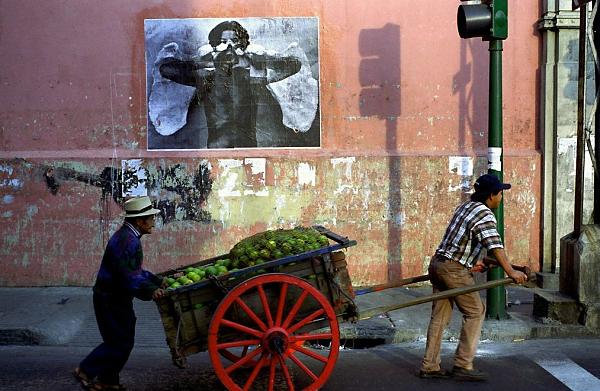 Daniel Hernįndez-Salazar
Angels Watch Over Memories of War
David Gonzalez on Daniel Hernįndez-Salazar
via Jim Johnson
_______________________
On Cruel Optimism
Lauren Berlant
ROROTOKO
Cruel Optimism is a book about living within crisis, and about the destruction of our collective genres of what a “life” is; it is about dramas of adjustment to the pressures that wear people out in the everyday and the longue durée; it is about the blow of discovering that the world can no longer sustain one’s organizing fantasies of the good life.
I’ll focus here on three matters. The first is the concept of cruel optimism (what’s optimism, what’s cruel about it). The second is on a particular scene—the end of the postwar good life fantasy and the rise of neoliberalism in the U.S. and Europe—in which the consequences of cruel optimism are lived collectively. The third is about the need for a realism that embeds trauma and suffering in the ordinary rather than in a space of exception, given that the crises of exhaustion and knowing how to live are problems saturating ordinary life....(more)
Depressive Realism: An Interview with Lauren Berlant
The Broken Circuit: An Interview with Lauren Berlant
_______________________
A proposal to classify happiness as a psychiatric disorder.
R P Bentall
Abstract
It is proposed that happiness be classified as a psychiatric disorder and be included in future editions of the major diagnostic manuals under the new name: major affective disorder, pleasant type. In a review of the relevant literature it is shown that happiness is statistically abnormal, consists of a discrete cluster of symptoms, is associated with a range of cognitive abnormalities, and probably reflects the abnormal functioning of the central nervous system. One possible objection to this proposal remains--that happiness is not negatively valued. However, this objection is dismissed as scientifically irrelevant.
via Riley Dog

photo - mw
_______________________
Mystical Anarchism
Simon Critchley on invisibility, opacity, resonance.
adbusters
We are living through a long anti-1960s. The various anticapitalist experiments in communal living and collective existence that de?ned that period seem to us either quaintly passé, laughably unrealistic, or dangerously misguided. Having grown up and thrown off such seemingly childish ways, we now think we know better than to try to bring heaven crashing down to earth and construct concrete utopias.
Despite our occasional and transient enthusiasms and Obamaisms, we are all political realists; indeed, most of us are passive nihilists and cynics. This is why we still require a belief in something like original sin, namely, that there is something ontologically defective about what it means to be human. The Judeo-Christian conception of original sin ?nds its modern analogues in Freud’s variation on the Schopenhauerian disjunction between desire and civilization, Heidegger’s ideas of facticity and fallenness, and the Hobbesian anthropology that drives Schmitt’s defense of authoritarianism and dictatorship (which has seduced signi?cant sectors of the left hungry for what they see as Realpolitik).Without the conviction that the human condition is essentially ?awed and dangerously rapacious, we would have no way of justifying our disappointment, and nothing gives us a greater thrill than satiating our sense of exhaustion and ennui by polishing the bars of our prison cell. Nothing can be done about it, we say. Humanity is a plague....(more)
_______________________

Fraser River Industrial
Fred Herzog
1961
_______________________
Poems
Federico Garcia Lorca
b. June 5, 1898
Translated by A. S. Kline
The Prisoner
Through the indecisive
branches
went a girl
who was life.
Through the indecisive
branches.
She reflected daylight,
with a tiny mirror,
which was the splendour,
of her unclouded forehead.
Through the indecisive
branches.
In the dark of night,
lost, she wandered,
weeping the dew,
of this imprisoned time.
Through the indecisive
branches.
Poetry In Translation A. S. Kline
_______________________
Poems
Rae Armantrout
Fallacies
(....)
*
Beneath the Darkness.
Between Notes.
Black.
Don’t Be Afraid of the Dark.
Don’t Go Into the Woods.
*
(....)
Blackbox Manifold
No. 8 (May 2012)
_______________________
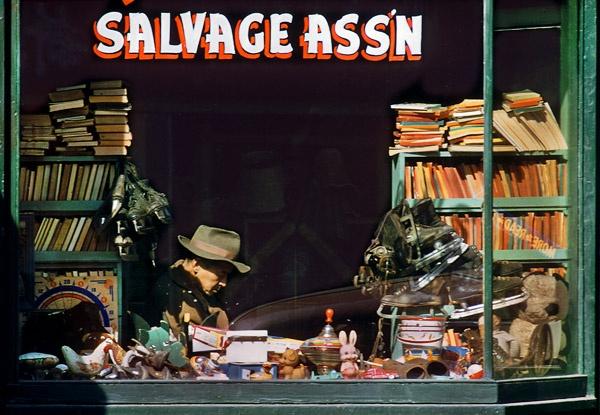
Salvage Ass’n
Fred Herzog
1958
_______________________
The more we use social media to try to individuate, the more we format ourselves to be machine processable, the more we reduce our ineffability to code.
Facebook and living labor
Rob Horning
(....)
It seems to me that Facebook, et al., represent capital’s current attempt to reconcile the productivity of subjectivity with capitalism and neutralize the liberatory potential inherent in that productivity. Social media allow us to expand our identity and the amount of work we can sink into it without that work prompting an escape from or an elaboration of alternative to capitalist relations. At the same time, that flow of work becomes increasingly deployable by capital to make profit as it sees fit even as it retains its unique meaningfulness for the worker. In other words, social media compel labor not through wages but through the promise of apparent self-actualization.
(....)
Social media presuppose the conditions of their popularity (network capitalism) are permanent, present themselves as solution to what they are actually instrumental in causing and perpetuating. They give shape to the emerging social factory, integrating the productivity of subjectivity into existing ways of doing business, prompting investment flows, and harvesting and distributing profit. That’s what is meant when tech startups are said to have “social” business models....(more)
_______________________
The Ruthless Overlords Of Silicon Valley
Facebook. Google. Zynga. They think they're saints of American capitalism. But they're really the successors to the Big Money magnates of the Gilded Age.
Rob Cox
The Daily Beast
_______________________
tripleC
Open Access Journal for a Global Sustainable Information Society
Vol 10, No 1 (2012)
_______________________

Lorenzo Garcķa Vega
1926 - 2012
photo - Pedro Portal
.....................................................
Lorenzo Garcķa Vega Now Sleeps in Playa Albina
Guillermo Parra
Venepoetics
(....)
In a quiet, fragmentary way, full of self-irony and implicit laughter, Garcķa Vega built the alternative to revolutionary, Neo-Baroque or post-structuralist tropicalism and its carnavals with more or less fortunate adjectives. No mueras sin laberinto, El oficio de peder, Cuerdas para Aleister and Devastación del hotel San Luis are some of the Garcķa Vega’s books, almost always written in what we could call poetic prose if we admit here that “poetic” has nothing to do with sentimentalism, coloratura, the magic of instants or the sublime epiphany: “I have just visited the grave of a friend who recently died, in Chacarita, and it makes me desperate to understand that the dead will always be lying down,” he wrote in Erogando trizas donde gotas de lo vario pinto, which his friend the poet Elsa López published last year in Ediciones La Palma; and also: “A sad reality of this Playa Albina where I live. Drums, knick-knacks. What in the end doesn’t sound, even after one spends the day playing the drum.” Playing the drum: writing the poem; persisting in what’s useless and even in what’s absurd as a —unique— form of survival. To create a self-portrait under the figure of one more piece of rubble from the century’s deliriums of greatness and their illuminated guides....(more)
_______________________

Waterfront Flaneur
Fred Herzog
1959
_______________________
Jerome Rothenberg's Poems and poetics
now at Jacket2
From America a Prophecy: Anthology as Collage
(Dekanawideh, Whitman, Pound, Stein)
Jerome Rothenberg
[In a previous posting on Poems & Poetics I followed Susan Howe’s lead in calling attention to the effort by George Quasha & myself – in America a Prophecy (1973) – to create a new form of anthology, not so much a ranking of notable American poets as a juxtaposition of disparate, often incongruous voices, putting collage or assemblage at the service of a new omnipoetics, “from pre-Columbian times to the present.” While that much was clear to some at the time of first publication, to others – like Helen Vendler in a characteristically obtuse review of the book – the point of the work was clearly beyond their tolerance or comprehension. What appears here, then, are the four opening poems from America a Prophecy, brought together as a foretelling of the total work to follow. That work, after a long hiatus, is newly re-available through Quasha’s Station Hill Press – a limited printing but enough to get the book back into circulation.]...(more)
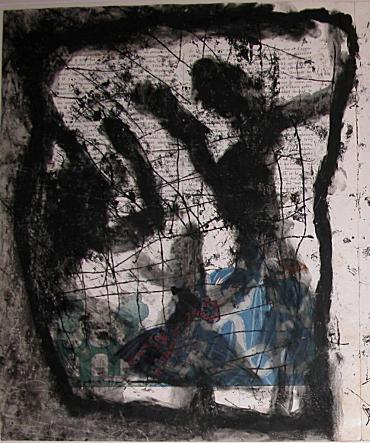
Louis Soutter
b. June 4 1871
_______________________
False Fronts in the Language Wars
Why New Yorker writers and others keep pushing bogus controversies.
Steven Pinker
Nature or nurture. Love it or leave it. If it doesn’t fit, you must acquit.
If you didn’t already know that euphonious dichotomies are usually phony dichotomies, you need only check out the latest round in the supposed clash between “prescriptivist” and “descriptivist” theories of language. This pseudo-controversy, a staple of literary magazines for decades, was ginned up again this month by The New Yorker, which has something of a history with the bogus battle.
(....)
The thoughtful, nondichotomous position on language depends on a simple insight: Rules of proper usage are tacit conventions. Conventions are unstated agreements within a community to abide by a single way of doing things-not because there is any inherent advantage to the choice, but because there is an advantage to everyone making the same choice. Standardized weights and measures, electrical voltages and cables, computer file formats, the Gregorian calendar, and paper currency are familiar examples.
(....)
What’s going on at The New Yorker? How could a magazine that cultivates a reputation for assiduous fact-checking publish a screed that is so filled with blunders, non sequiturs, and fanciful attributions? The article must have had something that resonated with the editors enough for them to have given it a pass. But what was it?
One theory is that a magazine like The New Yorker, with its emphasis on formal correctness and its own house style—the most eccentric in the industry, with its diaeresis over the vowels in cooperate and reelect and so on—is bound to be touchy about matters of usage and the need to uphold standards. But another is that The New Yorker’s obtuse coverage of “the language wars” is symptomatic of the problems it has with science. ...(more)
_______________________

(Cafe, Paris), 1935
Fred Stein: Paris / New York
Robert Mann Gallery
_______________________
McTaggart and Borges
roger gathman
Limited, Inc.
If you are a man of a certain age, according to all the wisdom literature I know, and it is a peaceful Saturday morning, and the adventures that have been the wind in your back or the life you have sloughed have come to a standstill, for one moment, then you turn your reflections to time and its possibility, or even its possible non-existence, a non-existence that would annul the fact that you are a man of a certain age, that it is Saturday, that adventure could have ever happened to you, and that you have a moment to reflect.
But reflect on time one must, because we are not watches. Watches toil not, neither do they sow – even though our language has given them hands and a face. Instead, they infinitely visit the same neighborhood of numbers. One can imagine watches different –one can imagine a little computer that you could strap to your wrist and that would just record the seconds, like a timepiece on a bomb, and thus give you a finegrained sense of your slice and dice advance towards death – or why stop there? Buried with such a thing, it could go on slicing and dicing your decay, your dust, your evaporation from this world. But at no point in its slicing and dicing would there be a moment, an aberrant moment, in which it wondered if it was really going anywhere, or measuring anything.
My two favorite essays on time are McTaggart’s The Unreality of Time and Borges’ A new refutatation of Time. ...(more)
_______________________
THEY say that “time assuages”,—
Time never did assuage;
An actual suffering strengthens,
As sinews do, with age.
Time is a test of trouble,
But not a remedy.
If such it prove, it prove too
There was no malady.
— Emily Dickinson
_______________________

New York
1942
Fred Stein
1909 – 1967
_______________________
What if we refuse to be citizens?
A Manifesto for Vacating Civic Order
Santiago López Petit
Translated by Sebastian Touza
borderlands
Today’s citizen is no longer a free person. Citizens are no longer free people who want to live in a free community. A political consciousness that is not taught, but rather conquered, has gradually disappeared. It could not have happened another way. Public space has become a street full of shops that never close, an ongoing television show in which an idiot tells us in detail why he separated from his wife. School, in turn, is not asked to promote a critical consciousness but to merely impart learning of ‘correct’ civic behaviors, variations of a pretense ‘education for citizenship’. Political struggles seem likewise to have disappeared from a world in which there are only diverse types of catastrophes (economic, environmental, natural, etc.). However, when politicians address us, when they pay lip service to calls of participation, they keep calling us citizens. Why? Why is this word, which little by little has been emptied of all political force, still in use?
_______________________
I Can’t Wash Away that Stench of Sulfur:
A Faustian Bargain Being Cooked up in America
Paul Haeder
Dissident Voice
(....)
So, we fail the test – we can’t produce youth or politicians or the great masses of working class who can connect those dots, can see the causation, can dream of abstracting why there is no right-to-work with dignity and living wages in the “right to work” states, that our human lobby is supposed to be the backbone of democracy and the public good, will, health and safety of the majority, that there are no human cells or intelligence-craving brains in a corporation.
These masters of the universe have some stinky, oily residue coming from their mouths, and like that shaman’s toad spores, the spewing brings forth mesmerized Americans, gringos and others turning into zombie shopping cart pushers. Instant gratification. Instant messaging. Mainline eating. Flip-cam education. Drone after drone. Every little copper widget and microprocessor and toilet plumbed and hot-dog served going to the military-surveillance-prison-finance monster that is what Jeff Bezos always dreamed of while sitting in the back of grandpa’s station wagon with Air Stream in tow and telling his grandmother that for each cigarette she was smoking, she was taking off a week of life at the end of life.
That’s their end game. Show us how we are royally screwed by boxing up junk, shipping that junk from sweatshops run by military specialists who can’t wait for the day to salute robots each and every day they go to work....(more)
_______________________
... corporations are doing just fine. Really really fine. They're making record piles of cash, their CEOs are making record piles of cash, and yet somehow they're not creating jobs. In others words, the line that high taxes and tough regulations are hurting corporations, thus preventing job creation, is a lie. A good old-fashioned completely full of it lie. The Republican way.
— Laurence Lewis
_______________________
Birthers, Billionaires and Fox: The GOP Freak Show in Full Effect
Eric Boehlert
_______________________
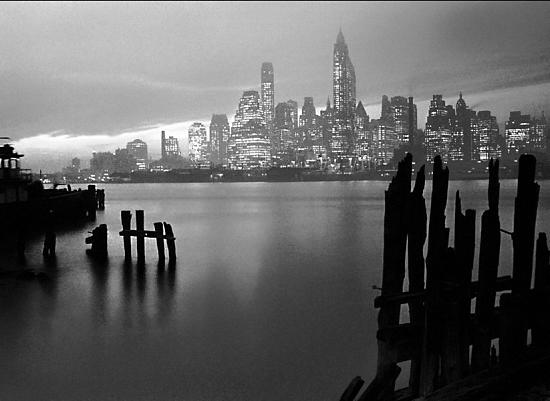
Manhattan Skyline
1946
Fred Stein
_______________________
The László Krasznahorkai Interview
Interview by Įgnes Dömötör
The Quarterly Conversation
(....)
I’m personally involved in the apocalypse… It’s interesting how your relationship to that changes in the course of your life. You think about it most when you’re young, particularly in connection with death, because you still have a certain courage that you’re going to lose when your own death is getting closer. Later you’re just afraid. When I was young, I didn’t feel the sanctity of birth. I tended to consider birth as the starting point of a journey toward failure, and I’d sadly look out the window for days on end into this grey light that was all that had been given to me. Anything that could arouse compassion had a great impact on me. I was particularly responsive to those aspects of reality and the arts that reflected sadness, the unbearable, the tragic. And I didn’t know what to do with anything positive or joyful. Happiness bothered me....(more)
_______________________
UbuWeb Top Ten
June 2012
Selected by Nick Zedd
filmmaker and theorist of The Cinema of Transgression
_______________________
Changing the Climate: Utopia, Dystopia and Catastrophe
Colloquy issue twenty-one
_______________________

photo - mw
_______________________
The Man in the Clearing
Iain Sinclair meets Gary Snyder
Coming through the woods, down a soft winding track, two minutes shy of the time we have been instructed to arrive, 10 a.m. on a bright Sunday morning, we see the man already there in the clearing, his right hand on the dog’s collar. Two minutes later, you feel, and he’d be gone. But this is the right person, undoubtedly, the one we have come to see. In a solid, heavy, hired car, a Chevrolet Impala, we have driven down the coast, on 101, from Seattle to Eureka, where a mudslide after weeks of rain diverted us over the mountains to Red Bluff, and on to goldmining country, Nevada City and the foothills of the Sierra Nevada. The man in the clearing, thin silver hair lit from behind, long blue work shirt over pink, is lean, of modest height, and steady as a post. The dog is more enthusiastic, a superior hillbilly poodle. It bounds forward to lick the passenger window, avid for society. As the man is not: he can take it when it comes, assess a situation, shape unshapely events to a predetermined programme and deliver what’s required, before returning to his proper business, a measured life in a portion of territory he has made his own.
(....)
The man in the clearing stays just where he is, his back to the house, as we clamber out of the car, and walk towards him, Emi butting against our thighs, nudging us on. Snyder is 82. He has presence before language, in the outdoor way of taking the temperature of a situation before acting. He’s had his brushes with the shadows that come with time, but he’s fit, weathered, narrow-eyed, skin creased and printed like a proper manuscript of mortality. ...(more)
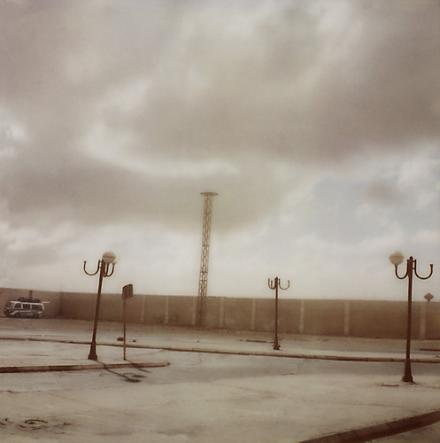
Silence After The Revolution
Floszmann Attila
_______________________
Three Poems
Geoffrey G. O'Brien
Second Intensity
I stood in Pound’s fake spring 100 years
Later, pessimistic the continuous
Renovations are really for us,
Mistaking thinking this for joining
A tradition of finding each other
Through laments we’re unavailable,
Bad light on the chambered face
Anonymous as a pomegranate.
Translation: I took the underground
Ferry to the past while waiting
For a train, pretended I could count
Mosaic, tally the work they had done
In navy and cream tiles for the three of us
Then five ranged along the platform
Never satisfied with being
A general petal of our privacy.
Observation: it’s embarrassing
Still to be using this system, antiquated
As reading a newspaper or using
The semicolon, looking into a face
Rather than at it; and the oldest thing,
Talking silently to the other strangers,
Which I’ve been doing seven minutes
Now into a lack of encouragement.
(....)...(more)
Wave Composition
'Driven mad, the sea, unable to die of one single wave'
via the page
_______________________
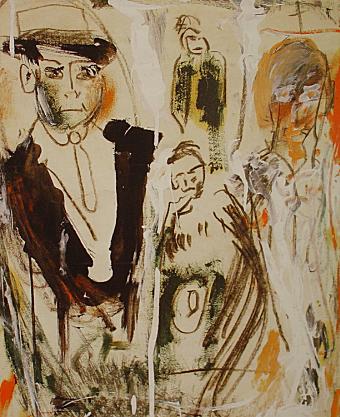
"Dr. Sax"
Jack Kerouac
(1952)
Too good for words:
When great authors pick up the brush
Kevin Murphy
Melville House
_______________________
Three Poems by Hamid Skif
translated by Pierre Joris
From the forthcoming Poems for the Millennium 4
HERE I AM
(....)
I walk clad in the breaths stolen from the tombs
in fragments of lost
stars
of petals found on the walls of time
I sing sweet cantilenas of freedom
I follow the traces of the knights of sand
the neighing of their mounts
the odor of their clotted blood
Every halt is my dwelling
I search for the ink-well of the centuries
the black rose of salt
a scream of fire
a tear of stone
wash your presence of its wounds.
...(more)
_______________________

Roadside
Yannik Willing
My pictures show architectural interference with nature and were taken during a road trip in Norway. I focused on the question of how the landscape is visually changed by this interference.
_______________________
How Markets Crowd Out Morals
Michael J. Sandel
How Markets Crowd Out Morals
a forum on the corrupting effects of markets.
boston review
Sugar Daddies
The old, white, rich men who are buying this election.
Frank Rich
5 Reasons the 'Geezer Empire' of Billionaire Republicans Are Showering Romney With Cash
Steven Rosenfeld
10 Billionaires' Dirty Tricks to Rig the System
Linda McQuaig and Neil Brooks
_______________________
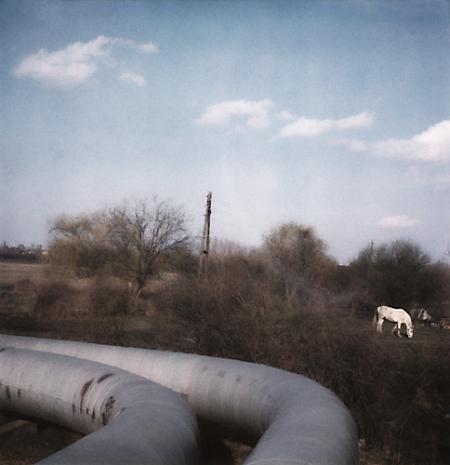
Stadt-Theater
Floszmann Atilla
via
_______________________
A Provisional Miracle: Dublinesque by Enrique Vila-Matas
Stephen Mitchelmore
(....)
Not that Riba is entirely happy with this literary web spinning, aware perhaps that it is the intellectual equivalent of alcohol ingestion; an induced reverie with damaging consequences. But then it follows that if the everyday of the reader proffers literary correspondences, adding a certain portentous grandeur to ordinary life, the end of literature will mean life disrobed and destitute, leaving him to endure what we might call enchantment hunger (which someone ought to use for a title). When Riba sees a strange suitcase in his Dublin hotel room, he recognises it is an appropriate incident for a novel, but he doesn’t want to be written by novelist of some cheap, conventional fiction. At the funeral, he sees a young man nearby who looks remarkably like a young Samuel Beckett, the “direct and essential heir” of Joyce. Riba now becomes obsessed with him. Could this stranger be the authentic genius to bring Riba and the Gutenberg age back to life?...(more)
_______________________
Emil Cioran’s heights of despair
Mairéad Hanrahan
(....)
One can well understand why this book (A Short History of Decay) had such resonance just after the war, with its passionate, forensic, often lyrical reflections on the origins of fanaticism. For Cioran, the root of all “ideologies, doctrines and bloody farces” is the life force itself, the vital instinct which leads people to believe passionately in any one thing rather than another. “Signs of life: cruelty, fanaticism, intolerance; signs of decadence: affability, understanding, indulgence.” Since “all faith exercises a form of terror”, it follows that sceptics are the “true benefactors of humanity”. Yet even sceptics show themselves to be fanatical about scepticism: “man is the supreme dogmatic being”. Life is a senseless tragedy made hideously worse by the human propensity to invest it with meaning, to find some illusion to believe in. The only alternative to the devastation caused by man’s capacity to delude himself lies in utter disillusionment:
I understood the non-sense of every gesture, every effort . . . . I wanted to defend myself against all men, react against their madness, discover its source; I listened and I saw – and I was afraid: afraid of acting for the same reasons or for any reason, of believing in the same phantoms or in any other phantom, of letting myself be intoxicated in the same way or in any other way; afraid, finally, of sharing a common delirium and expiring in a crowd of ecstasies . . . . It is troubling to think that . . . all sink into lying because they do not suspect the equivalence, in nullity, of pleasures and of truths.
This desolate pessimism explains why Samuel Beckett is the contemporary most often associated with Cioran. Although they did not meet until 1961, Beckett was the writer for whom Cioran felt the deepest affinity. The section devoted to him is one of the few unequivocally admiring pieces in Exercices d’admiration (1986), a set of meditations on figures as diverse as Joseph de Maistre, Paul Valéry and Scott Fitzgerald. In many respects, Beckett’s and Cioran’s views of the world are strikingly similar. “If each word wins us a victory over nothingness, it is only to subject us further to its power”; “existing has only one meaning: immersion in suffering”; “Sick with hope, we always wait; and life is only waiting become hypostasis”; “the interval separating me from my corpse is a wound”; “How to recover from being born?” – the Irishman could conceivably have signed all these quotations....(more)
|


